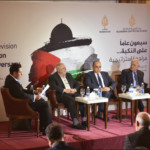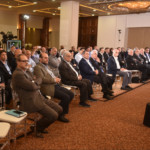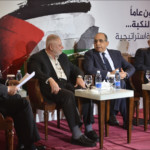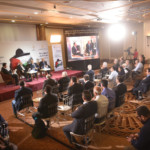A joint research seminar entitled “A Strategic Revision of the Nakba on its 70th Anniversary” was organized by al-Zaytouna Centre for Studies and Consultations and Al Jazeera Center for Studies, on Thursday, 10 May 2018, at Ramada Plaza, Beirut. A select of academics, intellectuals and activists concerned with the Palestine issue attended the event, which discussed the most important milestones that affected the conflict with the Israelis, liberation and the return of land.
Moderated by the TV interviewer, Salem al-Mahruqi, the seminar discussed four main topics: The successes and failures of the Palestine issue, the Arab and Muslim support or obstruction, the most important features of the “deal of the century” and its impact on the Palestine issue, and the prospects of different scenarios.
At first, Dr. Mohsen Mohammad Saleh, the general manager of al-Zaytouna Centre, detailed the most important failures in the history of the Palestine issue; the 1948 catastrophe, loss of 77% of the land, displacement of about 60% of its people, and the establishment of Israel. Then, the 1967 war and the loss of the rest of Palestine, the Golan and Sinai. He added despite of the 130 UN resolutions, refugees failed to return. The wars against Israel failed, Arab and Muslim support declined, and the cause became only a Palestinian concern. Arab countries prevented cross-border resistance.
Saleh acknowledged the growth of the Zionist project and its rising strength, the migration of 3.2 million Jews to Palestine, and the fact that 45% of the world’s Jews were supported by major powers to establish a state above the law. As for the Palestinians, they are divided, and no Palestinian institution is gathering them under one umbrella. The Palestinian political system is weak, the Palestine Liberation Organization (PLO) has failed, lacking vision, priorities and programs, with fragile institutional structure and weak leadership. The peace process and the two-state solution have failed, the Palestinian Authority (PA) in the West Bank (WB) has become an authority serving the occupation, and several countries have normalized their relations with Israel.
Saleh then, detailed the main successes in Palestinian history: Keeping the Palestine question a living central global issue, leading the regional and international scene, and the more it is marginalized, the more it re-imposes itself. The Palestinian people are steadfast on their land despite all suffering, and they will outnumber the Jewish population in 2018. Israel has failed to become a normal state in the region, and the public still refuses normalization with it. Palestinian resistance has developed and had major successes in three wars, in addition the Intifadahs and popular resistance have continued. As for Palestinians abroad, they have maintained their identity and effectiveness and led the Palestinian national project for many years, adhering to the right of return…
Saleh asserted that Palestine, Jerusalem and al-Aqsa Mosque are still the cause unifying the nation, and that the Palestinian people succeeded in preserving their Palestinian identity through institutions.
Lebanese Palestinian Dialogue Committee Chairman Dr. Hassan Mneimneh said that Palestine is still alive in the conscience of the Arabs and that all Israeli attempts to abolish the Palestinian people have failed. Palestinians have succeeded in imposing their presence and establishing their right to this land. However, and despite all sacrifices, Palestinians failed to counter-balance Israel and impose their conditions and legitimate demands, due to the roles and circumstances of many Arab countries.
Palestinian International Law Expert Dr. Anis al-Qasem said that 70 years after the Nakbah, the official Arab mentality still views the Zionist movement as a movement that can be reconciled with. The Arabs signed the Camp David Accords, Wadi Araba Treaty, and the Palestinians got involved in the Oslo Accords, which is one of the most dangerous agreements to the Palestine issue since its beginnings. For it did not contain a single text preserving the rights of the Palestinian people. The Palestinian leadership agreed to divide the already divided lands, and the WB was divided into three administrative divisions: Areas A, B and C. In contrast, these Accords did not assert the right of self-determination for the Palestinian people and did not impose on Israel the withdrawal from the occupied territories nor the right of return of Palestinian refugees. Similarly, this happened with all Arab-Israeli agreements, where Israel guaranteed its control.
What adds insult to injury is the fact that the Palestinian leadership did not comprehend such a “Zionist colonization,” and still believes that it can negotiate with Israel, but in fact it is impossible to reach any solution with it.
Concerning the Oslo Accords, Saleh said that it is a catastrophe to the Palestinian people, and the most dangerous part is the fact it did not discuss basic issues: the future of Jerusalem, settlements, Palestinian sovereignty, right of return, and the borders of the Palestinian state. All of these were postponed, thus the leadership had nothing in its hands to force Israel to withdraw, and the latter became able to decide on its own and according to its interest.
Saleh added that the Israelis managed the peace process rather than reaching a peace settlement, and the PA has become an entity that serves the occupying state rather than becoming a real state. For 70 years, the maximum offered by Israel to the peace process does not reach the minimum that the Palestinians expect. The PA became a “functional” entity serving the occupation.
Concerning the Oslo Accords, Mneimneh said that what is primarily required from the Palestinians is a strategy that coordinates diplomatic work and struggle action, for to reach a settlement with Israel, power balance must change, Palestinians must unite, and consequently they would be able to impose on the Arab world a unified confrontation policy with Israel.
Al-Qasem said that there was absolutely superficiality in how the Egyptian regime saw the conflict and when it signed the Camp David Accords. Its defense budget has doubled since it was in war with Israel. He added that it was impossible to reach solutions that would restore the right to its owners if autonomy was meant only for the people and not their land. This does not meet the minimum Palestinian demands.
As for the Arab role, Mneimneh described the Arab and Islamic role as supportive. The surrounding countries embraced refugees and tried to provide all forms of support. This Arab sympathy continued at the popular level, adding that in the beginnings, Arab regimes considered the Palestine issue a central cause, but then, there were a number of changes. He said that Palestinian schism weakened the cause, and major Arab countries are now overwhelmed with their own issues, thus becoming farther from supporting the Palestine issue. The Palestinians, especially Fatah and Hamas, must unite their political house before fighting the occupation. They have shared responsibility, the occupation is expanding and the Palestinians live an escalating conflict.
Afterwards, Dr. Adnan Abu Amer, head of the Political Science and Media Department at the Ummah Open University in Gaza Strip (GS), joined the panelists via satellite, to discuss the “deal of the century.” He said that this deal has different evaluations, but there is a consensus on the liquidation of the Palestine issue by establishing a Palestinian state in GS. Experts say that US President Trump, until now, has fulfilled two of his promises (Moving the US embassy to Jerusalem and the withdrawal from the Iranian deal) and a third one remains (Solving the Palestine issue by making the “deal of the century”). Abu ‘Amer stressed that PA’s behavior indicate that it is trying to pass some kind of a deal, by pressuring GS and not involving the resistance. As long as there is no pen to sign the deal, things look difficult. More political positions are expected in addition to protests that oppose the deal. He added that the Palestinians need Arab and Islamic support to succeed in this step.
Saleh commented that no one can impose his will on the Palestinian people. They will thwart the deal, despite the enormous difficulties they face.
In contrast, al-Qasem said that there are several indications that the deal will pass; the Palestinian leadership did not take any action to confront it, and the division between Fatah and Hamas still exists. Al-Qasem blamed both parties for this division, for the dangers ahead are much more important than any reason for not completing the reconciliation. He said that confrontation requires institutions other than those existing now, which are weak and non-effective. He added that the Arabs are promoting this deal and this raises fears for Palestinians, whereas the Palestinian leadership took no action to restructure its institutions in order to be able to oppose it. Al-Qasem stressed that the Oslo Accords are far more dangerous the “deal of the century,” for the former was ratified by the Palestinians themselves, while the latter is being imposed by outsiders.
Mneimneh pointed out that some Americans believe that the moment for settling the Palestine issue has come. This deal serves the Zionist project, and the Israelis would have indirect control, thus, he added, he believes that no Palestinian or Arab official would accept such a deal.
Abu ‘Amer commented that despite schism, the bad Arab situation, and the unipolar international system, it is unlikely that this deal will pass, for such conditions were available for previous deals, and they did not succeed, in addition, the peoples and public opinion are still against Israel. He added if this deal is destined to pass, sooner or later it will fail, because it runs contrary to the rights of the Palestinian people and doesn’t provide the minimum accepted by Palestinians.
Concerning the future for the Palestine issue, Saleh said that there are three scenarios: First, there would be an increased Israeli domination, influence and expansion, and a further Arab decline and Palestinian division. Further normalization would be witnessed, WB would be transferred into cantons, and the resistance in GS would fail. Second scenario, the conflict would continue, and the conflicting parties would achieve tactical victories without being able to change the balance of power. Third, resistance forces would rise, new forces of change and unity would appear in the strategic environment surrounding Palestine, and a unifying revival project in the region would emerge, making Palestine its top priority and redirecting the compass toward Palestine.
Mneimneh stated that there is a glimmer of hope, and the world has not yet succumbed to the US decision. The recent European and Arab positions are considered good, maintaining the minimum. He added that there are several impediments to the Trump project, and that there are European and Arab positions that we have to support.
Al-Qasem stressed that this issue is infected with incurable “intransigence,” due to the firm resistance. Those who look at the return marches in GS, in which the third and fourth Palestinian generations have participated, would be assured that the Palestine issue is engraved in the Palestinian conscience, and that these generations are capable of resisting until they achieve their goals.
During the seminar, viewers saw a report on the statements of Palestinian and Arab leaders concerning the Palestine issue and Israel, establishing a Palestinian state, the peace process, deal of the century, and national fundamentals. It included Yasir ‘Arafat, Ahmad Yasin, Mahmud ‘Abbas, Khalid Mish‘al, Isma‘il Haniyyah, Gamal ‘Abdel Nasser, Husni Mubarak, Muhammad Morsi, and ‘Abdul Fattal al-Sisi. Another report was about views of the Arab public on the “deal of the century,” and then the panelists answered some questions from the audience.








Leave A Comment